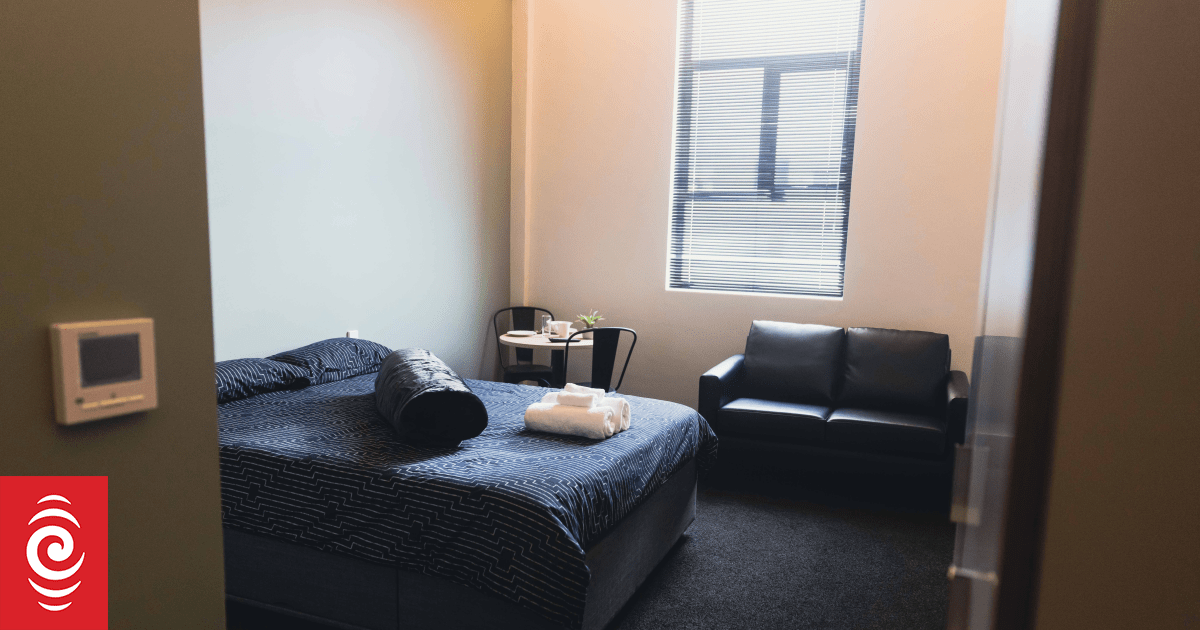One of the rooms in Wellington City Mission’s Te Pa Pori transitional housing complex.
Photo: Dom Thomas
An advocacy group is warning the government’s response to homelessness could put women at risk.
On September 5, Housing Minister Chris Bishop and Associate Housing Minister Tama Potaka announced the government had expanded the support available for people sleeping rough – which included work to “increase the efficiency of transitional housing”.
“This means making sure that we have the right transitional housing properties in the right locations and with the right providers to ensure we can better support demand,” Potaka said.
“There could be some rebalancing of places towards providers who have demonstrated an ability and willingness to work with rough sleepers.”
Associate Housing Minister Tama Potaka.
Photo: RNZ / Marika Khabazi
The Coalition to End Women’s Homelessness project director Victoria Crockford said, while the language was vague, a “rebalancing” could be at the expense of those who work with a specific group of people experiencing homelessness – such as women, children or older people.
She said research by the group last year found New Zealand’s 57,000 homeless women “would do anything to avoid sleeping rough” due to the additional safety concerns of gendered violence.
Crockford also warned of the government replacing emergency housing with transitional housing without a plan for “the potential unintended consequences”.
“The rise in rough sleeping has not happened because more people are choosing homelessness,” she said.
“It has come about because of a set of policies that are managing emergency housing policies by exclusion, at the same time as a tough economic context, which is pushing more people into housing precarity.”
Jo Cribb, who was on the Coalition to End Women’s Homelessness’ steering committee, said the government’s focus on sleeping rough would be denying women who are homeless access to support.
“We’re going to see our homelessness problem exacerbated. It isn’t solving the problem by focusing on one part of homelessness.
“Women make up 50 percent – or more – of the homeless population, and they aren’t the ones rough sleeping, so this is only really focusing on the ones you can see.
“The invisibility of women’s homelessness should not be ignored.”
Cribb, who was also the chairperson of Wellington Homeless Women’s Trust – a charitable trust providing transitional housing for homeless women – said every policy decision made around housing, particularly around homelessness, needed to take a gender-based lens.
“If this announcement had done that, the government wouldn’t have focused on only rough sleeping.
“Women and men’s experience of homelessness is very different, and we need a range of services that are going to work for all.”
Jo Cribb
Photo: Supplied / Arvid Eriksson
Cribb said the Coalition to End Women’s Homelessness had to work hard with government agencies for them to even collect data by gender.
“Up until very recently, no data was collected by gender, which means the policy makers are flying blind when they are making policy decisions.
“I think this focus on rough sleepers does show that there’s more work to do so that we have policies that are effective for all of those who are experiencing homelessness.”
The Ministry of Housing and Urban Development has been contacted for comment.
Sign up for Ngā Pitopito Kōrero, a daily newsletter curated by our editors and delivered straight to your inbox every weekday.

